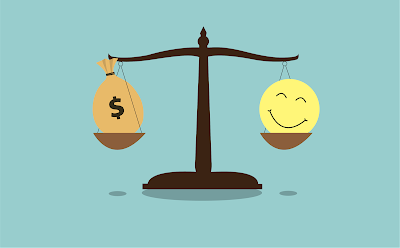THE CORRELATION BETWEEN WEALTH AND HAPPINESS
In modern society, an individual's income and possessions are equated with success. A dream for luxuries is constantly fed into our minds as kids. The idea of one's uniqueness lies in how much more does one have. Today there stand no limitations to what can be bought with money. Although, it holds a different meaning for different people. For some, it is a means to fulfill their basic necessities and for some, it is a means to manifest a fancier lifestyle. This takes us back to the age-old question, "Can money buy happiness?".
Several studies have been done to site the correlation. Out of these, the most infamous was that of a 2010 Princeton University study by Daniel Kahneman and Angus Deaton. They found that an individual's day-to-day happiness increases with an increase in annual income, but it is leveled off above $75,000 and happiness is plateaued. In contrast, the 2021 University of Pennsylvania study by Matthew Killingsworth suggested that happiness rose steadily with increasing income well beyond $75,000 with no evidence of a happiness plateau.
Later, integrated research was done with the collaboration of Killingsworth, Kahneman, and Prof. Barbara Mellers, where it was concluded that on average, larger incomes are associated with ever-increasing levels of happiness. For most people, increasing income results in increasing happiness. An unhappy cohort in each income group shows a sharp rise in happiness up to $100,000 annually, after which it plateaus. The exceptions are the people who are financially well off but unhappy in life.
THEORIES
There are a few theories on why money can buy happiness:
- People spend in ways that reduce suffering and increase enjoyment. People use the money to buy or experience the luxuries of their choice. Often, it is through money that a person can possibly actualize their dreams by investing in things that bring them joy. One Swedish study concluded that lottery winners had greater life satisfaction and mental health, and were more prepared to face misfortunes of life.
- Increase in income leads to greater control over one's life. Sense of control accounts for 74% of the correlation between income and happiness. World's longest study on happiness - the Harvard Study of Adult Development acknowledges that money gives us a sense of security, safety, and control over our lives.
- Money is said to reduce a person's time poverty, which means not having enough time for all of the everyday needs and wants and constantly working. A person has more time to do things of their choice if well off financially. However, recent studies have opposed the idea stating that time poverty increases with increasing income.
- High earners were happier if they thought money was important. If a person highly values wealth, then an increase in wealth will result in increased happiness. The meaning differs from person to person.
ALTRUISM AND HAPPINESS
Altruistic behavior leads to an increase in happiness. This hypothesis was tested by a classic experiment by Elizabeth Dunn and colleagues(2008) on people walking down the streets of Vancouver, Canada. Participants were given an envelope with $5 and $20 notes. The first half of the participants were asked to spend on themselves and the other half were asked to try donating the money to charity. They were given the time till 5pm. In the conclusion of the study, what the participants bought for themselves made no difference, and those who spent on others were found to be significantly happier.
TYPES OF WELL-BEING
Psychologists refer to two types of well-being when measuring happiness: evaluative and experienced. The Evaluative well-being responds to the question - "how do you think your life is going?" Experienced well-being answers the question - "what emotions are you feeling every day and in what proportions?" Non-material things predicted experienced well-being, which emphasizes experiences (travel and vacations) over possessions. Such experiences help us grow our social connections and bond with loved ones.
FINAL WORDS
We can deduce that money does lead to increasing enjoyment and decreasing suffering. However, how it affects a person's happiness depends upon how important they consider money to be. A person or a society might or might not correlate money directly with success and consider other factors to be more important such as connections and relationships. The more money someone has, the more they will want it as happiness will halt at one point. There is no guarantee that one will continue to keep themselves happy with ever-lasting income. So, money mustn't be considered happiness itself but rather a means to the things one values.
***


Well written. Keep writing and maintain this good work.
ReplyDeletegreat job!
ReplyDeleteYour skills are growing day by day. Keep posting such content.
ReplyDelete